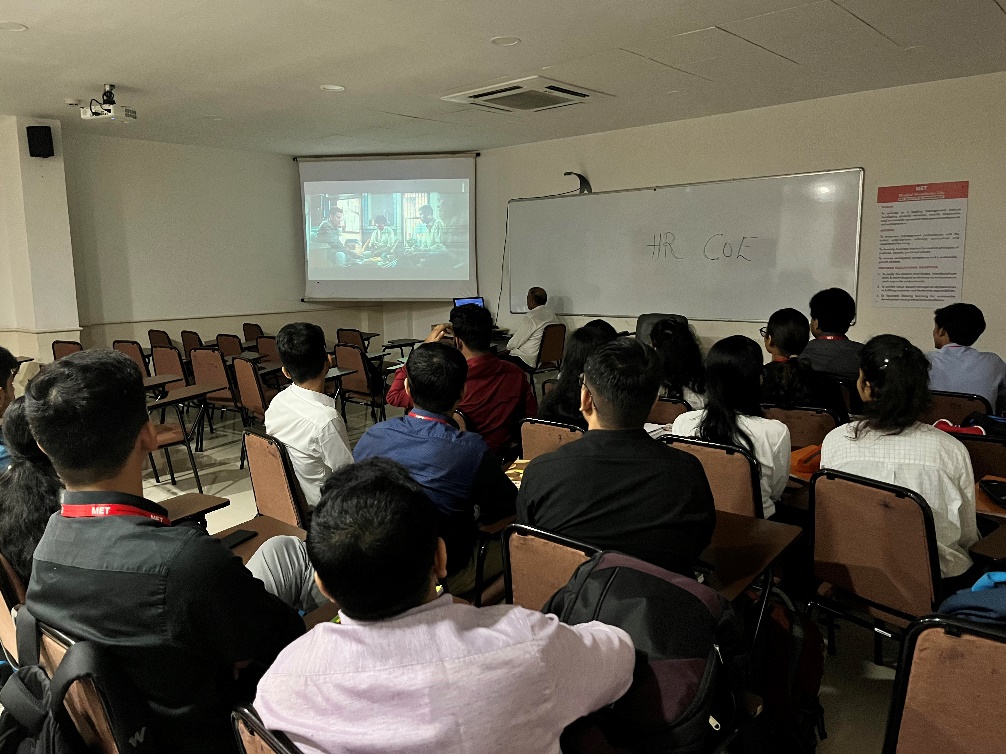
MET Institute of Management in its constant endeavor to develop business leaders to succeed in the competitive and dynamic business world, adopts teaching pedagogies using tools and technology and exposing students to experiential learning across management courses taught. Innovative teaching pedagogies are learner-centric and interdisciplinary in nature equipping students with the latest knowledge, skills and growth mindset to help thrive in a rapidly changing global economy.
Simulation Games
To help facilitate experiential learning and build analytical skills, faculty members use the aid of simulation
games along with the traditional lecture delivery. Management simulations are an extension of the case based
learning methodology. By simulating real-world business scenarios, students are able to correlate theoretical
knowledge to practical situations and develop a deeper understanding of management concepts. These games provide a
hands-on experience that foster critical thinking, problem-solving, and decision-making skills in students of
management education.
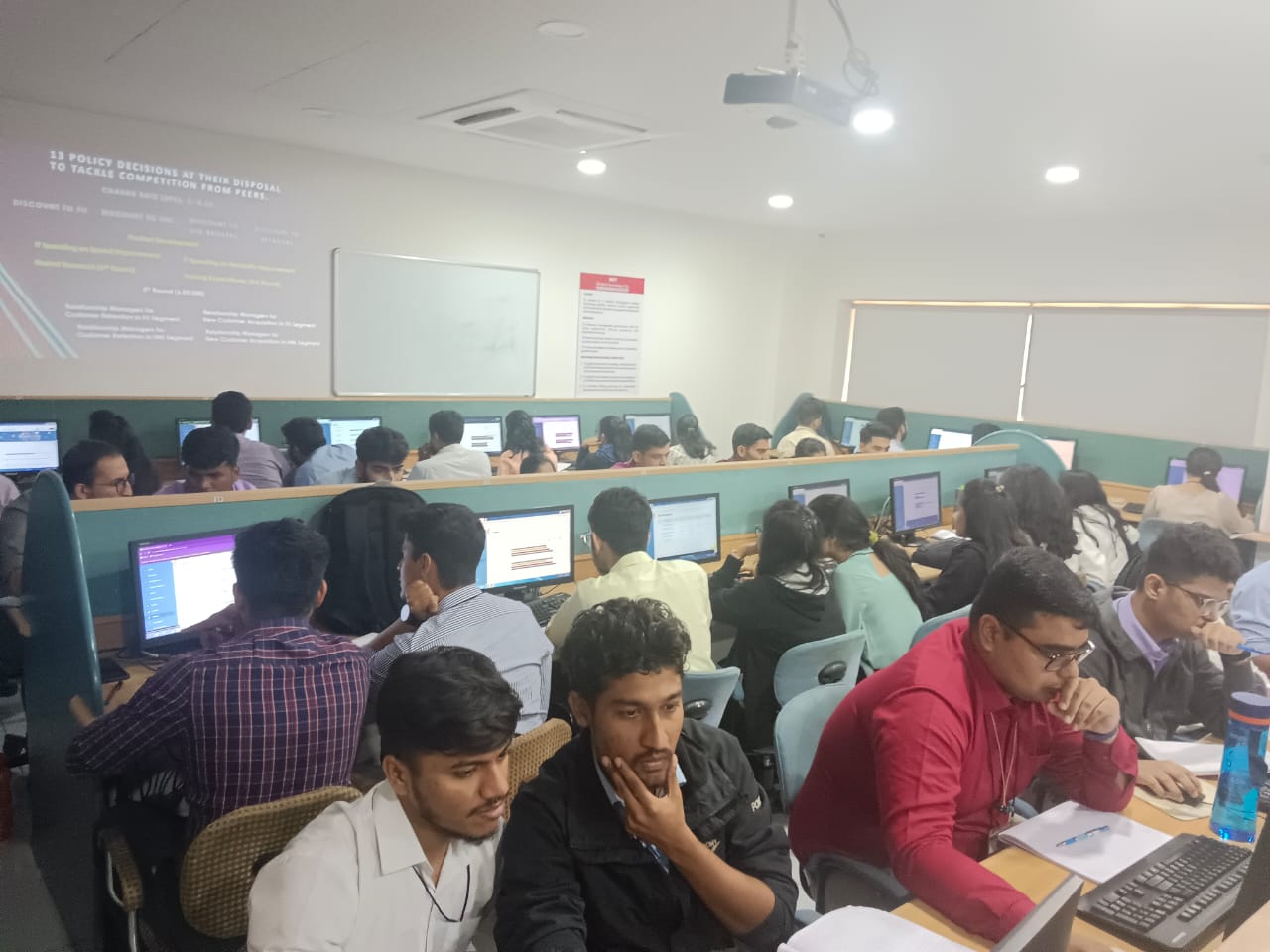
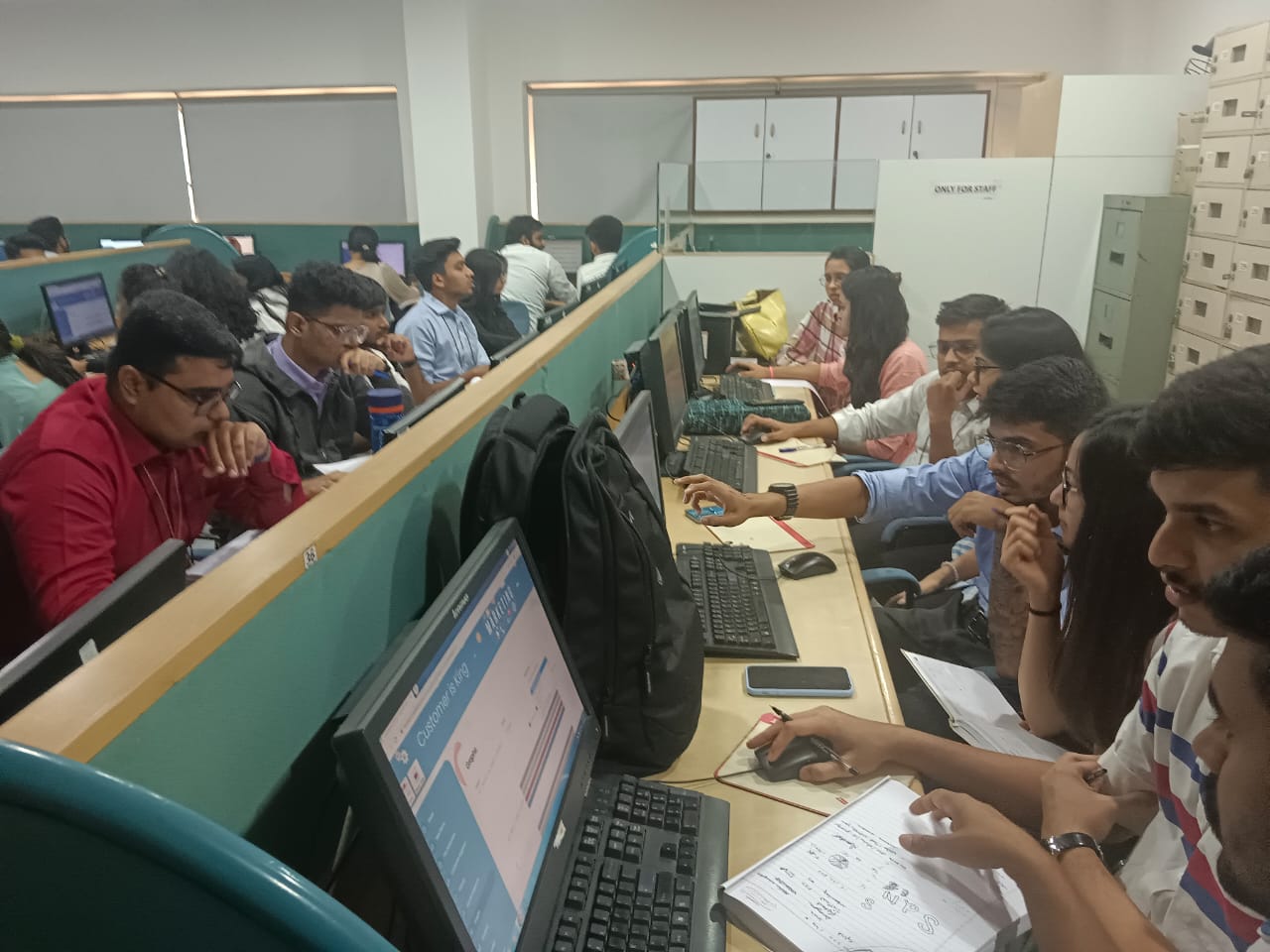
MMS students participating in Simulation Game
Creation of Virtual Portfolio
Students are given a unique assignment to play role of Fund Manager to understand Portfolio management with
fundamental and Technical analysis. Each student is asked to select a company of their choice and get share price
data for last three years and apply all concepts taught in the class for calculating returns and identifying
buy-sell signals on the basis of various technical indicators. At the same time student have to get annual reports
for the same period and do the valuation of the company. It helps them to understand the various aspects of
fundamental and technical analysis for particular sector/company.
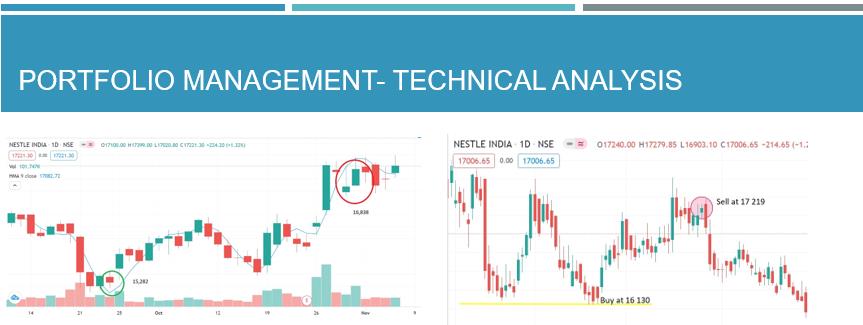
Sample of Portfolio Analysis by MMS Student
Peer to Peer Learning
Peer to Peer is a mutual learning and training initiative where students learn in a collaboratively setup. Peer to
peer learning sessions are conducted for courses of a technical background (Business Statistics, Managerial
Economics, Financial Accounting and IT for Management). It further complements and aids classroom learning conducted
by the concerned faculty member. Students are assessed basis tests conducted in the P2P sessions and marks are used
for student categorization and enhanced learning
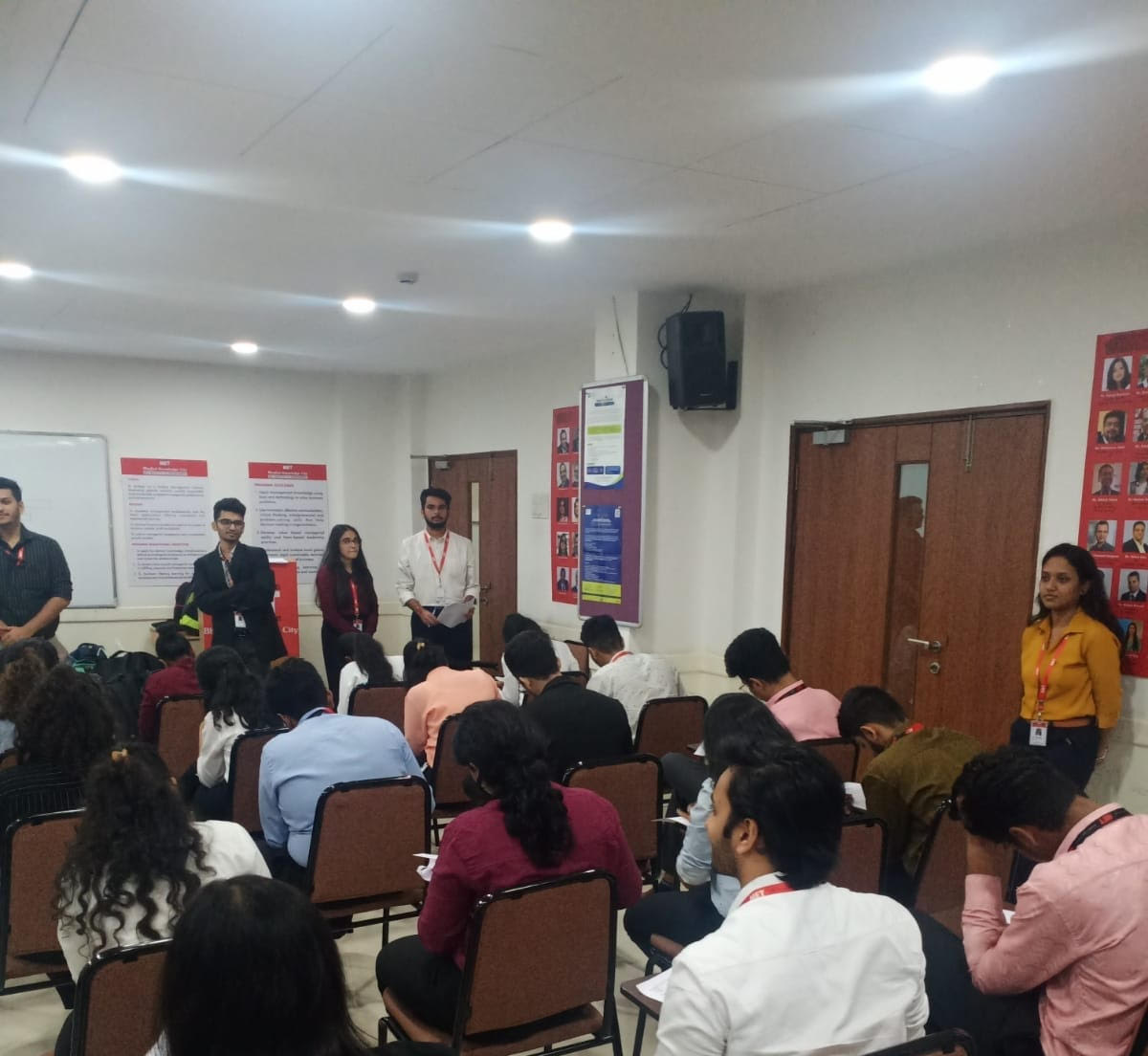
Students in Peer to Peer Learning Session of Business Statistics
HR Concept Simulation
Students visit organizations from different sectors in groups and interview the HR professionals to gather relevant
and practical data for the topics allocated to them. This assignment helps students draw a deeper connection to the
theoretical concepts taught in the classroom. Corporate data based group presentations help students connect the
conceptual HR to practical Corporate HR.
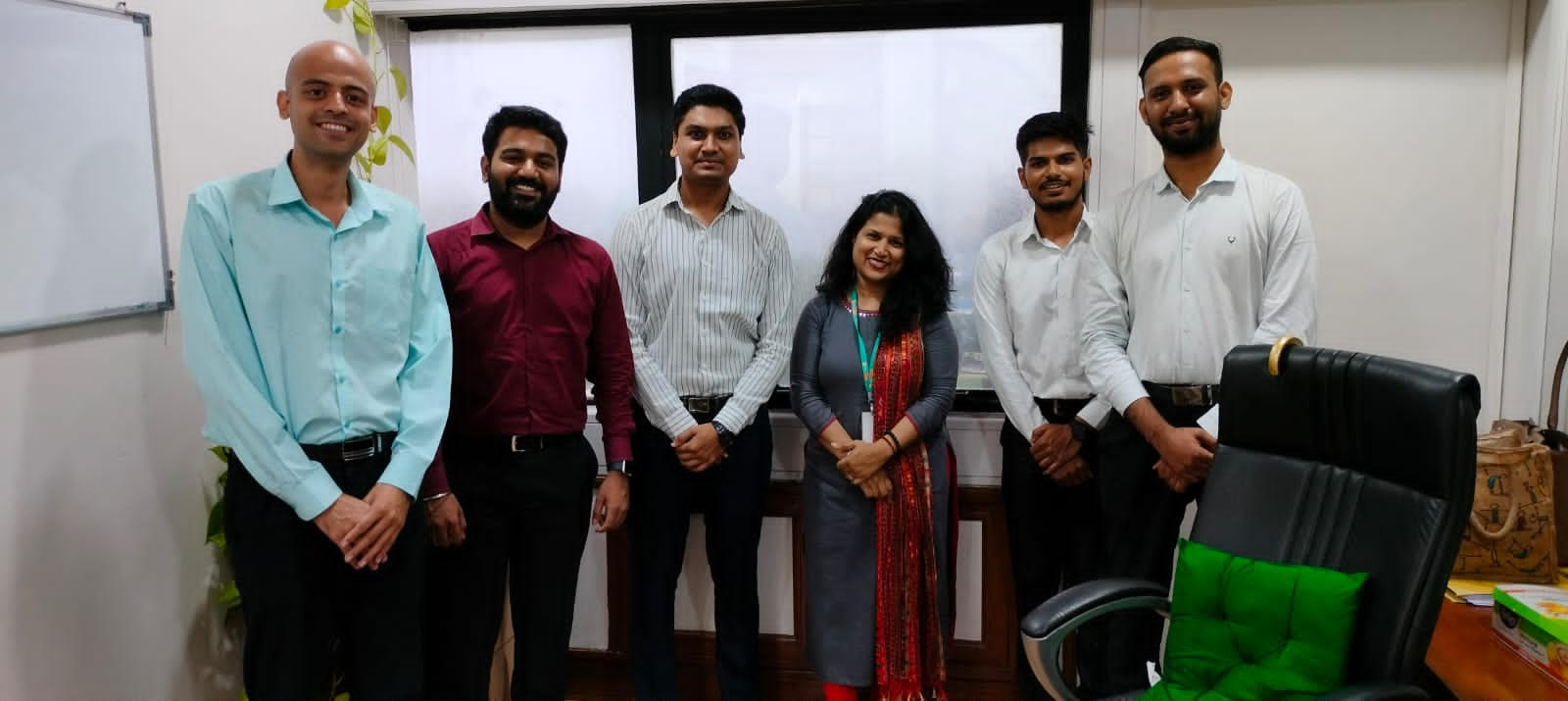
Interaction of MMS students with Dr. Priyanka S, Vice President, HR, IDBI Capital Markets & Securities Ltd
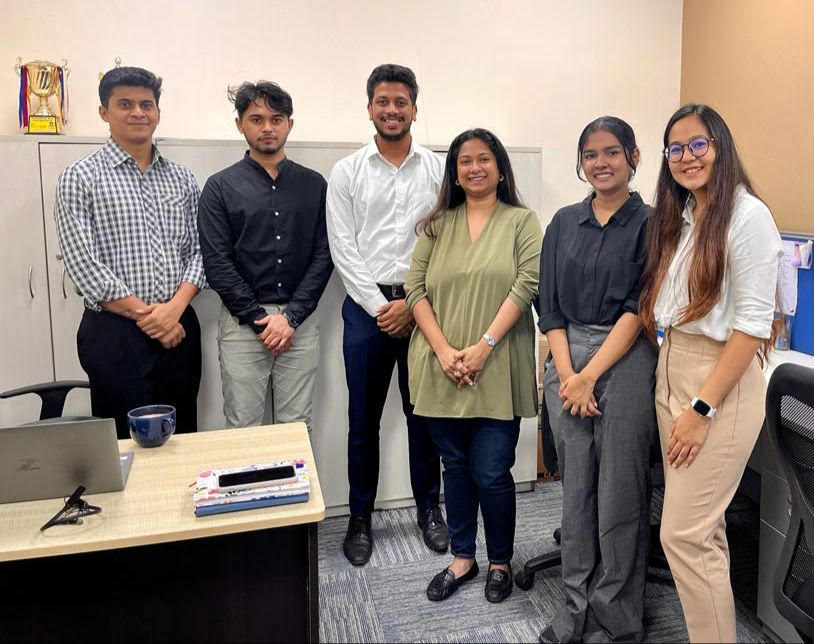
MMS Students with Ms. Kalka Dutta, Sr. Human Resource Manager, TATA Steel
MET Insights
MET Insights is fusion of Knowledge & Learning. It is creating a reservoir of consistently giving content in
context to the latest trends and contemporary knowledge to MET students and developing an engagement with them. The
content shared is a mixture of latest trends, innovation, upgradation, reports, memes, podcasts, news, videos, case
study, interviews, infographics, in the fields of HR, Finance, Marketing, IT, Business Analytics, Operations,
Management, etc.
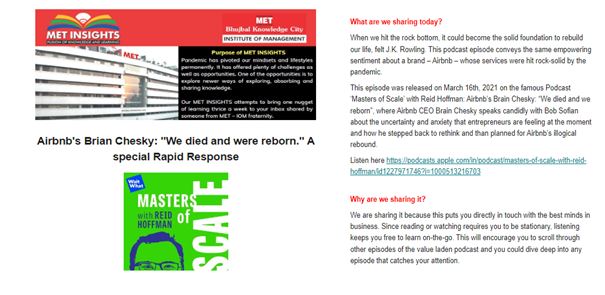
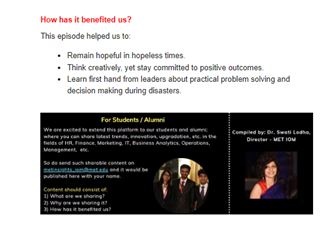
MET Insights shared with stakeholders
Usage of Management Tools
Visual tools help teachers establish, explain, connect, and associate ideas and concepts to make the process of
learning more interesting, enjoyable, and effective. There are initiatives taken by faculty as per their subject.
For Entrepreneurship Management subject students are being told to make a Business Model Canvas. The Business Model
Canvas is one of many useful tools to design, evolve and test products and services business models. It is a visual
representation of the 9 key building blocks that form the foundations of every successful business. It’s a blueprint
to help entrepreneurs invent, design, and build models with a more systematic approach. Once the Business Model
Canvas is ready students display that in the classroom with the usage of flip charts.
Similarly, for the subject OB & HRM students are being encouraged describe the culture of the organizations
through the display of chart paper wherein they display through the blocks or tables the impact of culture on
individuals. Also for subjects like Economics & Business Environment students are expected to make a Factsheets
which are later on displayed in the classroom.
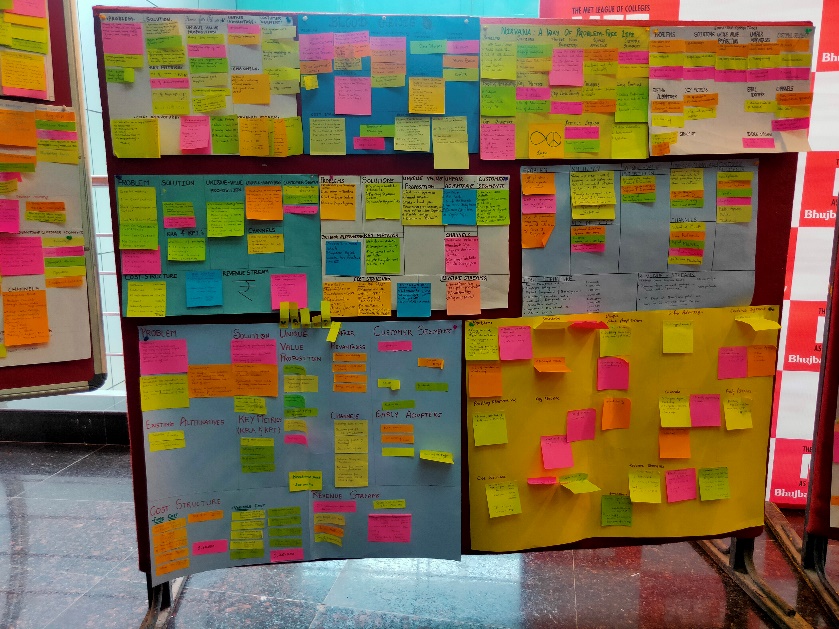
Business Model Canvas by MMS Students
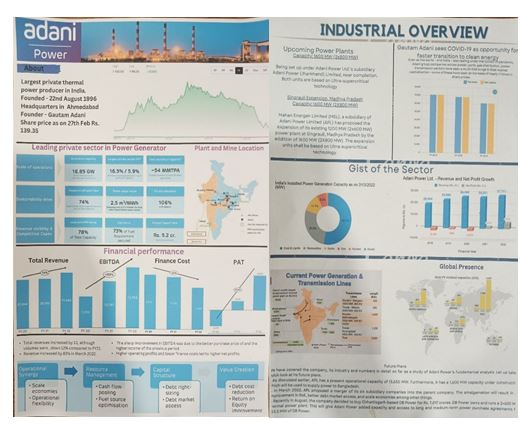
Fact-sheets prepared by MMS Students
Teaching Contemporary Management Subject – Circular Economy, Data Analytics
Recognizing the need to develop contemporary business managers with a strong focus on purpose, people, profits and
planet, students are offered an additional course of ‘Circular Economy’ during their second semester. Students are
provided Energy Literacy Training, Circular Design and Climate Change as a part of the course. Students also undergo
30 hours of training on Data Analytics.
MET Institute of Management in collaboration with ICCE has launched India’s First Circular in 2022. This Circular
Lab works as a Resource Centre for Research & Innovation, Capacity Building, Networking, Policy making and a
shared knowledge platform.
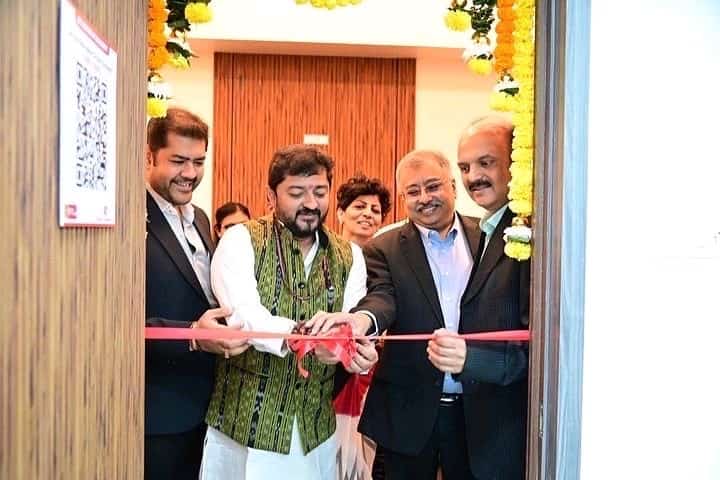
Inauguration of India’s First Circular Lab
Collaborative Teaching
The Institute in its effort to strike a balance between theoretical and practical exposure to students, encourages
Industry-Academia collaboration for subject being taught. Subjects are divided and delivered by Corporate Experts in
collaboration with the teaching faculty member. In addition, subjects are divided amongst multiple faculty members
to allow for better lesson plans, dynamic assignments and overall greater student learning.
| Subject | Faculty In-house / Corporate |
|---|---|
| Financial Accounting | Prof. Sunny Mondal (Assistant Professor, MET IOM) CA. Jimit Makwana (Tax Consultant) |
| Perspective Management | Prof. Arun Patil (Assistant Professor, MET IOM) Mr. Satvinder Madhok (CTO & Global Head of Technology Infrastructure, Identity Access & Cyber Security, Wipro Technologies) |
| Entrepreneurship Management | Prof Shailesh Sargade (Assistant Professor, MET IOM) Ms. Smedha Sarkar (Founder & CEO EduMaan Training Services LLP) |
| Legal & Tax Aspects of Business | Prof. Sunny Mondal (Assistant Prof, MET IOM) Mr. Uday Prabhupatkar (General Manager – Indirect Taxation, Tecnimont Pvt Ltd) |
| Financial Markets and Institutions | Prof. Sunny Mondal (Assistant Prof, MET IOM) Mr. Vinay Shivdasani (Executive Director & Practice Head, Ambit Private Limited) |
| Marketing Strategy | Prof. Manmeet Barve (Associate Prof, MET IOM) Mr. Nikhil Asopa (Head – Customer Service, Tata Digital) |
| Sales Management | Prof. Shailesh Sargade (Assistant Professor, MET IOM) Mr. Amit Sharma (Co-Founder, Sault) |
| Digital Marketing | Prof. Sana Khan (Assistant Professor, MET IOM) Ms. Darshana Shirodkar (Senior Director, Expedia Group) |
Role Plays
In order to understand various management education topics, real-world examples must be understood. Role-playing
exercises are among the instructional strategies that encourage pupils to learn effectively. It fosters
self-assurance, imagination, communication, physical growth, and problem-solving skills. In addition to being
enjoyable, it gives pupils the chance to adopt a persona and act out either a real-life part or a fictional
performance. They possess the ability to apply ideas in an appropriate setting. It encourages academic excellence
and thinking outside the box in the classroom.
Cine-Education
Cine-education is a useful and cutting-edge teaching tool that can help students understand management concepts
through a fresh perspective. Faculty members use cine-education as a source of a potent and engaging learning
technique. The exercise is application-focussed to make sure that the student’s theoretical foundation is solidified
by the use of numerous instances, and to reinforce the idea clarification through video clips. It helps to make
learning more enjoyable and improves concept retention.
